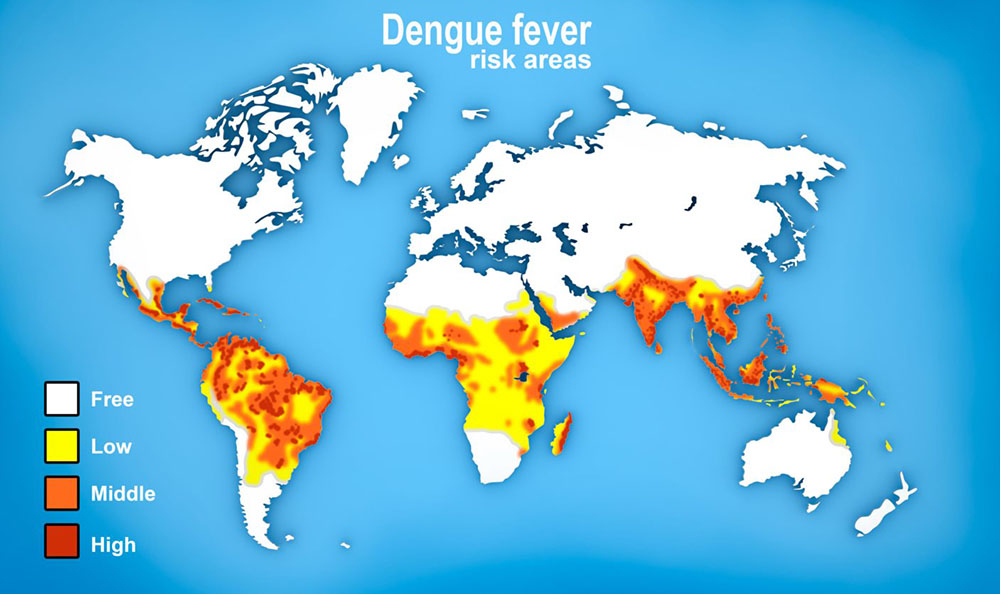Dengue fever
Key facts
- Dengue fever is caused by the dengue virus.
- You can catch dengue fever when a mosquito infected with dengue virus bites you.
- Most people who have dengue fever recover in about a week, but sometimes the infection is more serious.
What is dengue fever?
Dengue fever or dengue virus infection is an illness with symptoms that are like a bad case of the flu. However, dengue fever is caused by a virus carried by mosquitoes. These mosquitoes are mainly found in: Asia, Africa and South America (see map).
Most areas of Australia do not have the type of mosquitoes that carry dengue. Outbreaks of the disease still occur in North Queensland every year. This happens when someone becomes infected overseas, and is then bitten by a mosquito in Australia. That mosquito can then spread dengue virus to others.

What are the symptoms of dengue fever?
If you have dengue fever, you may have:
- a sudden fever
- headache — pain behind your eyes
- chills
- swollen glands
- muscle and joint pain
- fatigue (feeling very tired)
- abdominal (tummy) pain
- nausea and vomiting
- a faint red rash
These symptoms can be mild or very bad.
Symptoms usually appear between 3 and 14 days after being bitten by the mosquito. The fever usually lasts for about 6 days.
Most people who have dengue fever recover in about a week. Sometimes, the infection is more serious, and occasionally it’s fatal (causes death).
What are the symptoms of severe dengue fever?
Severe dengue (also known as dengue haemorrhagic fever) is rare but can lead to death. Symptoms of severe dengue can start 3 to 7 days after the first symptoms of dengue.
People with severe dengue feel very unwell and have extra symptoms such as:
- severe abdominal pain
- rapid breathing
- persistent vomiting
- vomit with blood in it
- bleeding gums
- unexpected bleeding
- restlessness
Dengue haemorrhagic fever occurs most often in children and young adults.
Getting different types of dengue, even years apart, increases your risk of developing severe dengue.
If you have dengue fever and feel very unwell, call triple zero (000) for an ambulance.
What causes dengue fever?
Dengue fever is caused by one of 4 dengue viruses that are carried by mosquitoes.
The dengue virus can be spread by 2 types of mosquito:
- the Dengue mosquito (Aedes aegypti)
- the Asian Tiger mosquito (Aedes albopictus)
Dengue is not passed directly from person to person.
When should I see my doctor?
If you have symptoms of dengue fever and are concerned, you should speak with your doctor right away.
FIND A HEALTH SERVICE — The Service Finder can help you find doctors, pharmacies, hospitals and other health services.
ASK YOUR DOCTOR — Preparing for an appointment? Use the Question Builder for general tips on what to ask your GP or specialist.
How is dengue fever diagnosed?
Your doctor will assess you by:
- talking to you
- examining you
- ordering blood tests
They may need to order a second blood test to help diagnose dengue fever.
How is dengue fever treated?
There is no specific medicine to treat dengue fever.
People who have dengue fever should get medical advice. It’s also important to:
- rest
- drink plenty of fluids
- reduce the fever using paracetamol
If you have dengue fever, do not take non-steroidal anti-inflammatory drugs (NSAIDs), such as aspirin and ibuprofen. These can increase your risk of bleeding.
If possible, have someone stay at home to look after you.
Can dengue fever be prevented?
There is currently no vaccine to prevent dengue fever in Australia. The best way to prevent it is to avoid being bitten by mosquitos.
How to prevent mosquito bites:
- Wear loose, long-sleeved, light-coloured clothing. Remember to also wear socks and covered shoes. Mosquitoes will bite through tight clothing.
- Use a mosquito repellent on exposed skin that contains DEET, picaridin or oil of lemon eucalyptus.
- Regularly check and empty any containers of still water around your home such as pot plant saucers. Mosquitos breed in still water.
The mosquitoes that transmit dengue will bite throughout the day. They’re most active in the hours after sunrise and before sunset.
Be extra careful when in areas with a higher risk of mosquito-borne diseases. This might be overseas or in Central and Far North Queensland. Use window screens or air conditioning.
If someone in your house has dengue, it’s very important to avoid mosquito bites. Mosquitoes can carry the infection from one person to another.
Complications of dengue fever
Some complications or signs of severe illness with dengue fever include:
- dehydration
- bleeding
- hepatitis (inflammation of your liver)
- shock
Severe dengue fever is rare but can lead to death.
If you have dengue fever and feel very unwell, call triple zero (000) for an ambulance.
Resources and support
You can call the healthdirect helpline on 1800 022 222 (known as NURSE-ON-CALL in Victoria). A registered nurse is available to speak with 24 hours a day, 7 days a week.
Learn more here about the development and quality assurance of healthdirect content.
Last reviewed: May 2023




















